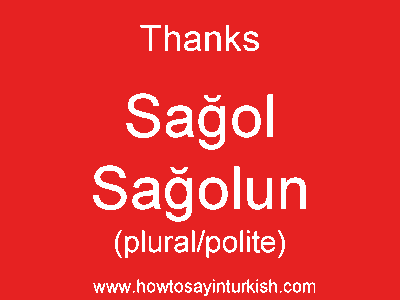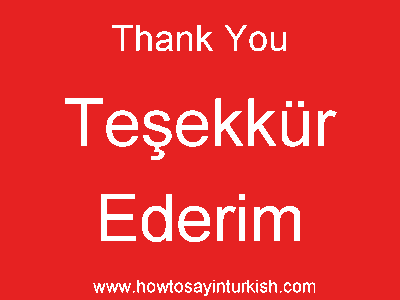Mastering "Thanks" In Turkish: Your Essential Guide To Gratitude
Imagine you're navigating the bustling Grand Bazaar in Istanbul, savoring a delicious kebab, or simply asking for directions. A kind local helps you out, and you want to express your sincere gratitude. But how do you say "thank you" in Turkish? While English might be spoken in some tourist hotspots, it's not universal, and learning a few basic Turkish phrases can truly enhance your experience and build connections.
The good news is, expressing thanks in Turkish is not only achievable but also highly appreciated by native speakers. Don't be embarrassed about trying; Turkish people are often flattered when you make an effort to learn their language. If you're visiting Turkey or Cyprus, there will be a lot of Turkish people around, and unfortunately, not all of them will speak English. This guide will walk you through the most common and versatile ways to say "thank you" in Turkish, along with examples, contexts, and pronunciation tips, ensuring you're well-equipped for your next interaction.
The Cornerstones of Turkish Gratitude: Teşekkür Ederim, Sağ ol, and Teşekkürler
Just like in English where we have "thank you," "thanks," and "much obliged," Turkish offers several ways to express gratitude. Understanding the nuances of each will help you choose the most appropriate phrase for any situation.
1. Teşekkür Ederim: The Most Common and Versatile "Thank You"
If you learn only one way to say "thank you" in Turkish, make it Teşekkür ederim. This phrase is the undisputed champion of expressing gratitude in Turkish, widely used across almost all situations, from formal interactions to casual exchanges.
- Literal Translation: "I thank you" or "I give my thanks."
- Pronunciation: "te-shek-kyoor eh-deh-rim"
- Usage: It's incredibly versatile. This is the most common way to say "thank you" in Turkish, and its literal translation is "I thank you." It can be used in both formal and informal settings. You can use it at a restaurant after a meal, in a store when making a purchase, or during a pleasant, random exchange with a stranger. It's the safest and most common form of thanks.
- Example: After a taxi driver gets you to your destination safely, the most polite and common way to thank him is, "Teşekkür ederim!"
Many language resources, including TurkishClass101, highlight Teşekkür ederim as the go-to phrase for expressing gratitude due to its widespread acceptance and clarity. It's often the first phrase learned by those visiting Turkey, and for good reason.
2. Teşekkürler: A Shorter, Often More Casual Alternative
While Teşekkür ederim is the most common, locals don't always stick to it. Teşekkürler offers a slightly shorter and often more casual way to say "thanks."
- Literal Translation: "Thanks" (it's the plural form of "thank you").
- Pronunciation: "te-shek-kyoor-ler"
- Usage:Teşekkürler is suitable for both formal and informal situations. It can be used when expressing gratitude to multiple people at once. While it's not as casual as some slang terms might be, it's generally perceived as a bit less formal than the full Teşekkür ederim, yet still widely accepted. It's not as casual as "teşekkürler" but still widely used to say thank you in Turkish. For the most part, you can use this almost everywhere.
- Example: If you've had a great time with a group of friends, you might say, "Teşekkürler, harika bir zaman geçirdik!" (Thanks, we had a great time!)
3. Sağ ol / Sağ olun: Wishing Well and Giving Thanks
Another common and widely used phrase to express gratitude is Sağ ol (singular informal) or Sağ olun (plural/formal).
- Literal Translation: "Be well" or "May you be healthy/sound."
- Pronunciation: "sah ol" (singular) / "sah oh-loon" (plural/formal)
- Usage: This expression carries a meaning of wishing someone well in return for their kindness. It's very common in everyday interactions. The choice between Sağ ol and Sağ olun depends on your relationship with the person (singular informal vs. plural/formal). It's not as casual as Teşekkürler but still widely used to say thank you in Turkish.
- Difference from Teşekkürler: In Turkish there’s a slight difference between Sağ ol and Teşekkürler. While both are common, Sağ ol has a more idiomatic "be well" feel to it, whereas Teşekkürler is a direct "thanks."
Formal vs. Casual: Navigating Politeness Levels
Turkish, like many languages, has different levels of politeness. While Teşekkür ederim is generally safe for all situations, understanding the nuances can make your interactions even smoother.
Formal Ways to Say Thank You
In formal situations, such as interacting with elders, people in positions of authority, or in professional settings, it is essential to use the appropriate level of politeness when expressing gratitude. Teşekkür ederim is the primary formal way to express gratitude. Its direct translation, "I give thanks," inherently carries a respectful tone.
These are often the first phrases learned by visitors to Turkey, and for good reason: they are universally understood and appreciated.
Casual Expressions of Thanks
For more casual interactions with friends, family, or people your age, you have more flexibility. Teşekkürler and Sağ ol (singular informal) are excellent choices. Remember, locals don't just stick to Teşekkür ederim all the time; they use a variety of expressions depending on the context and their relationship with the person.
Beyond Just "Thank You": Saying "No Thank You"
Sometimes, you might need to politely decline an offer. Knowing how to say "no thank you" is just as important as knowing how to accept with gratitude.
- No Thank You: The most common way to say "no thank you" in Turkish is "Hayır, teşekkür ederim." ("Hayır" means "no").
Why Your Effort Matters: Cultural Appreciation
When you're visiting Turkey or Cyprus, you'll find a vibrant culture and warm people. While some individuals, especially in tourist areas, might speak English, it's not a given. Trying to communicate in Turkish, even with just a few phrases like "thank you," goes a long way.
Turkish people will genuinely be flattered that you're learning their language. It shows respect for their culture and a willingness to engage. You might even find that your efforts open doors to more authentic experiences and warmer interactions. If you're unsure about pronunciation, don't hesitate to ask a tour guide or a friend to talk you through it. There are also many online resources, like TurkishClass101, that provide perfect translations and audio pronunciations to help you master these phrases.
It's worth noting that Turkish, as a rich language, might have some regional variations in expressions, including how "please" and "thank you" are conveyed. However, the phrases discussed here are widely understood across the country.
Final Thoughts
Learning how to say "thank you" in Turkish is one of the most fundamental and rewarding steps you can take when interacting with Turkish speakers. Whether you opt for the versatile Teşekkür ederim, the concise Teşekkürler, or the well-wishing Sağ ol / Sağ olun, your effort will be appreciated. These phrases are more than just words; they are bridges to connection and respect. So, go ahead and practice them – you'll be expressing gratitude like a local in no time!
In summary, while there are many ways to say "thank you" in Turkish, Teşekkür ederim is your safest and most common bet, suitable for almost any situation. Teşekkürler offers a slightly more casual alternative, especially when addressing multiple people, and Sağ ol / Sağ olun conveys a warm wish of well-being. Mastering these key phrases will significantly enhance your interactions and show your appreciation for Turkish culture.

How do you say "Hello" and "Thank You" in Turkish? : How to say in Turkish

How do you say "Hello" and "Thank You" in Turkish? : How to say in Turkish

Как сказать спасибо по турецки: 4 шагов